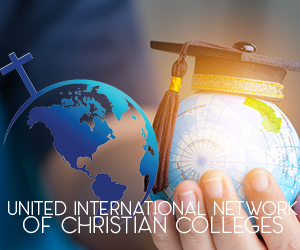

Education that matters
The United International Network of Christian Colleges (U.I.N.C.C.) works in partnership with Good Shepard Ministries founders of the International School Of Ministry (I.S.O.M.) curriculum. Both U.I.N.C.C. and I.S.O.M. work in conjunction with various degree granting agencies such as the Transworld Accrediting Commission International which is a federally recognized, non-profit, church educational organization whose philosophy is to demonstrate accountability to the consuming public for education obtained in nontraditional evangelical education institutions.
The United International Network of Christian Colleges (U.I.N.C.C.) is currently a self-accredited Institute of Higher Education who is actively pursuing additional accreditations with the following Non-Governmental Accreditation Agencies:
The primary reason an Academic Institution may desire to be Accredited by a Governmental Accrediting Agency (such as the U.S.D.E.) is to obtain their U.S.D.E.A. (The United States Department of Education Accreditation) / “Seal of Approval”. This Government Accreditation then makes these Academic Institutions eligible to apply to receive Federal and State Government Funding for its Institution or College.
In many instances, in exchange for these funds, these Academic Institutions must then enter into an agreement with the Federal and or State Government(s) to adopt and convey Secular and Humanistic Theological Stances within its curriculum which in many instances are not in agreement with Traditional Judeo/Christian Values nor the Biblical Theological Stances of many Private Christian Academic Institutions such as Christian Schools, Bible Colleges as well as many Mainstream Bible believing Churches.
For this reason, the Governing Board of The United International Network of Christian Colleges (which is a Private, Self-funding Network of Christian Colleges), has agreed not to seek, pursue nor accept Federal or State Government Accreditation nor their Secular Mandates in exchange for their Funding. Thus, the United International Network of Christian Colleges is not accredited by an agency recognized by the U.S Secretary of Education. Rather, U.I.N.C.C. has committed to adhere itself to Accreditation Institutions such as those previously conveyed, who in many instances have qualifications for Academic Accreditation and Excellence which far surpass the standards being called for by the United States Government Accrediting Agencies such as the U.S.D.E.A.
Additionally, prior to the United States Federal Government stepping in to regulate Education within the United States through the formation of the U.S.D.E.A. (United States Department of Education Accreditation) on October 17th of 1979, America was ranked #6 in the world for education. Today, America is ranked far below its former ranking as #27 in the world for educational excellence. With this undeniable dismal failure of educational oversight The Question then must be asked…
“Why would any credible education system desirous to convey Christian values, while maintaining high standards of educational excellence even consider submitting itself to a subpar, ever increasing, anti-Christian accrediting agency, who has self-proclaimed itself to be the “The National Standard” for excellence in education when in fact all evidence has shown them to be just the opposite” ?
The Answer clearly is – “It would not”.
Sadly, decades of recorded U.S.D.E. academic underperformance as well as years of accumulated anti-religious policies have proven that this government run accrediting agency clearly is not “The Education Standard” to be emulated. This is particularly true where and when Christian Education Institutes seek to exercise their Constitutional Right to the practice of their Freedom of Religion, and where no Federal or State Funding is being requested nor supplied for that Christian Education System’s ongoing and successful operations.
NOTE: In the USA, I.S.O.M. does not function as a federally accredited training school, does not personally award degrees nor seek to qualify for Federal Student Loans. I.S.O.M. supplies curriculum materials for Churches and other Ministries such as U.I.N.C.C. to run their own programs and has articulation agreements with various Universities and Seminaries who themselves grant degrees as described in this document. None of these programs are federally recognized nor are they intended to be used for employment advancement. The academic credits obtained through I.S.O.M., U.I.N.C.C., and its’ accrediting agencies is not transferrable to most Federally and State funded and accredited institutions. I.S.O.M. is however accredited through the Transworld Accrediting Commission International (TACI) which is a federally recognized, non-profit, church educational organization whose philosophy is to demonstrate accountability to the consuming public for education obtained in nontraditional evangelical educational institutions.
Concluding, as far as practical Christian ministry training is concerned, few programs on earth will outshine I.S.O.M. / U.I.N.C.C. with respect to its world class instructors, course content, ease and diversity of use, multiplicity of available languages and affordability.